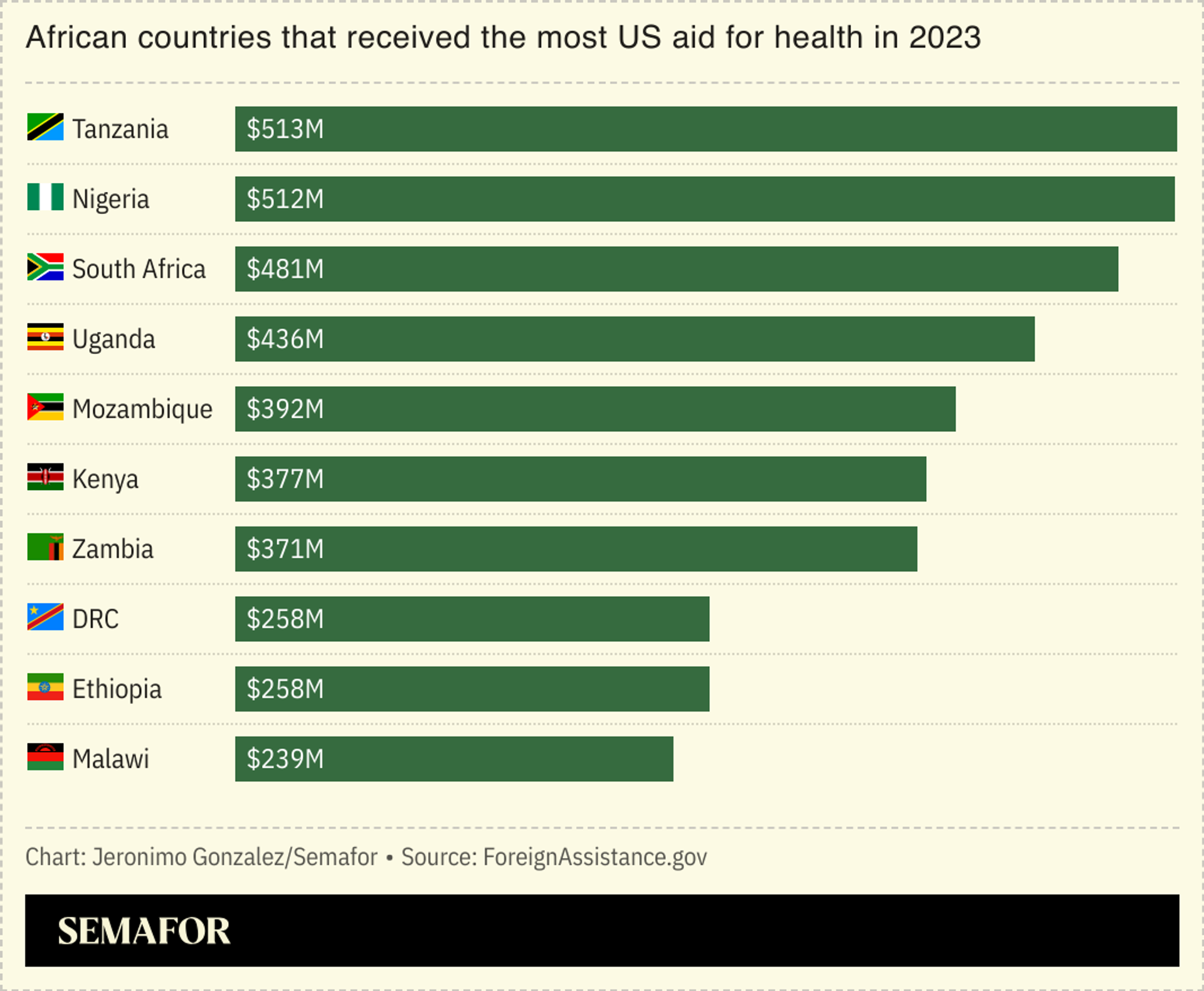The News
The European Union said it cannot plug the funding gap left by the United States suspending aid programs, as governments across Africa try to keep critical health care services running.
The US is the largest single aid donor in the world, disbursing some $72 billion in assistance in 2023, much of it through the US Agency for International Development (USAID). In that same year the EU, the largest collective donor, contributed almost $100 billion.
“We will not step back from our humanitarian commitments,” a European Commission spokesperson told Semafor, saying the bloc’s 2025 humanitarian budget alone stands at $1.9 billion — with $510 million earmarked for Africa. But the spokesperson added: “The funding gap is getting bigger, leaving millions in need. The EU cannot fill this gap left by others.”
The comments come as sub-Saharan Africa reels from the impact of the Trump administration’s decision to suspend USAID spending for a 90-day review. The vast majority of the agency’s budget in the region goes on humanitarian and health aid — USAID spent more than $11 billion there in 2024, according to official figures — and the freeze has already shuttered services spanning from HIV clinics in Uganda to immunization programs in Nigeria.
Know More
Catherine Kyobutungi, head of the Nairobi-based African Population and Health Research Center, warned last week that the health of millions of Africans was at stake without the rapid mobilization of funds to fill the gap left by the US. The programs that USAID funds on the continent are vast and crucial. In Uganda, nearly two-thirds of the HIV program budget came from PEPFAR, the flagship US President’s Emergency Plan for AIDS Relief, while in 2023 Nigeria received $600 million in health assistance from the US, around 20% of its then health budget.
Despite the US issuing waivers to continue funding certain lifesaving programs, services continent-wide remain stalled. In Kenya alone 54,000 health care workers could lose their jobs due to USAID-funded programs coming to an end.
Programs that support sexual and reproductive health and rights are among those worst-hit. “A lot of people working in this space have lost funding,” Kehinde Ajayi, director of the Gender Equality and Inclusion Program at the Center for Global Development, told Semafor.
Step Back
Africa’s governments are in crisis mode. Late last week Nigeria approved a provision of $200 million in its 2025 budget to plug gaps created by the suspension of US aid to its health sector. In Ghana, President John Dramani Mahama directed his finance minister “to take urgent steps” to bridge the estimated $156 million funding gap, voicing particular concern over malaria prevention and maternal and child health.

The unfolding emergency has prompted calls for traditional donors to fill in the funding gaps. Romilly Greenhill, CEO of Bond, a British network of international development organizations, urged the UK and EU “to help mitigate the impact of the USAID freeze.” And last week two CGD authors wrote: “The US’s absence should encourage other provider countries to step up,” pointing to countries including Germany, Sweden, and Japan. China — whose development assistance to Africa is framed differently to the West — could convert some of its loans to grants, they said.
But how likely are other nations to step up? The US retreat from foreign assistance is part of a “broader trend” among traditional donor nations, Zainab Usman, director of the Africa Program at the Carnegie Endowment for International Peace in Washington, told Semafor. Several countries like Canada and the UK have reduced development assistance in recent years.
For middle-income countries such as Kenya, Nigeria, and South Africa, this could be a “wake-up call,” said Usman, while stressing that the abrupt USAID freeze was not the way to go about it. “I hope this can be the moment where countries think about creating fiscal space, combating corruption and plugging leakages, so they can retain enough resources to fund the health and education programs that are going to lose funding.”
But it will be much harder for lower-income countries: In seven African countries that rely on US assistance, aid is an average 11% of their gross national income.
Preeti’s view
The number and scale of programs funded by USAID in Africa makes it unlikely that any one donor could cover the shortfall. As Ajayi told me, this is a moment “for coalition building,” with key roles for other countries as well as multilateral lenders, philanthropic organizations, and middle-income African nations.
At best, there is an opportunity to delink foreign aid and critical health services. There is certainly growing momentum for alternative models. But that won’t happen at the speed this sudden freeze demands without any time for planning a transition. The White House is rewriting the rules of US foreign aid and the effects are going to be felt for years to come.
Room for Disagreement
In a memo last month, US Secretary of State Marco Rubio sent a clear message on services the new administration is no longer prioritizing. The freeze waiver “does not apply to activities that involve abortions, family planning conferences, administrative costs... gender or DEI (diversity, equity, and inclusion) ideology programs, transgender surgeries, or other non-life saving assistance,” he wrote. Tech billionaire Elon Musk, head of Trump’s Department of Government Efficiency, put it this way on X: “USAID is a criminal organization. Time for it to die.”
Notable
- The US “loses soft power” due to its USAID freeze decision, Ghana’s President John Mahama told Bloomberg, warning it creates space for other countries to fill the gap.
